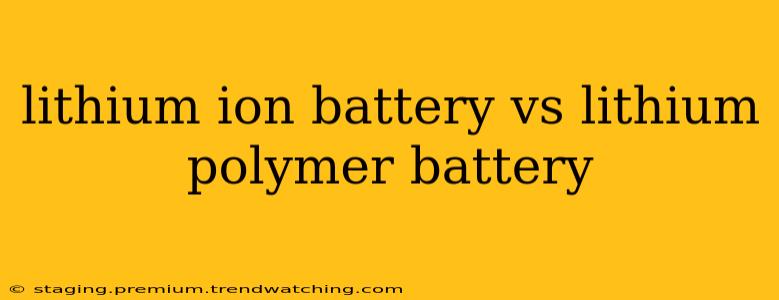Choosing the right battery technology for your needs can be tricky, especially when faced with the seemingly similar options of Lithium-ion (Li-ion) and Lithium-polymer (LiPo) batteries. While both are rechargeable and utilize lithium ions for energy storage, several key differences influence their suitability for various applications. This comprehensive guide will dissect the nuances of each, helping you make an informed decision.
What is a Lithium-ion Battery?
Lithium-ion batteries are a common rechargeable battery type using lithium ions to move between a positive and negative electrode, generating an electric current. They're ubiquitous in portable electronics, power tools, and electric vehicles, thanks to their high energy density, relatively long lifespan, and relatively low self-discharge rate. However, they're typically composed of a rigid metallic casing, making them less flexible than their polymer counterparts.
What is a Lithium-polymer Battery?
Lithium-polymer batteries, often shortened to LiPo, also utilize lithium ions for energy storage, but the key difference lies in the electrolyte. Instead of a liquid electrolyte like in Li-ion batteries, LiPo batteries employ a solid or polymer gel electrolyte. This fundamental change enables several advantages, particularly in terms of flexibility and safety.
Key Differences Between Lithium-ion and Lithium-polymer Batteries
Here's a breakdown of the critical distinctions between Li-ion and LiPo batteries:
Energy Density:
-
Li-ion: Generally offers slightly higher energy density, meaning more power packed into the same volume. This translates to longer run times for devices with the same physical size.
-
LiPo: While offering excellent energy density, it is often slightly lower than Li-ion batteries, particularly in higher capacity cells. Advances in LiPo technology are constantly bridging this gap.
Safety:
-
Li-ion: Can be prone to overheating and catching fire, particularly if damaged or improperly charged. Their rigid casing offers some protection, but it's not foolproof.
-
LiPo: Generally considered safer due to the non-flammable polymer electrolyte. They are less likely to overheat or catch fire, although still require careful handling and proper charging to prevent accidents.
Flexibility & Design:
-
Li-ion: Typically have a rigid, metallic casing, limiting their design flexibility.
-
LiPo: The use of a polymer electrolyte allows for flexible and thin designs, opening doors for innovative form factors in various devices. This makes them ideal for applications requiring curved or oddly shaped batteries.
Lifespan & Cycle Life:
-
Li-ion: Exhibit a good lifespan with a decent number of charge-discharge cycles before experiencing significant degradation.
-
LiPo: The lifespan and cycle life can vary considerably depending on the quality and usage. While some high-quality LiPo batteries boast impressive lifespans, others may degrade more quickly, particularly with improper charging or storage.
Cost:
-
Li-ion: Generally less expensive than LiPo batteries due to mass production and established manufacturing processes.
-
LiPo: Often more expensive, partially due to the more complex manufacturing process and higher material costs.
Charging:
-
Li-ion: Typically utilize standard charging protocols.
-
LiPo: Often require specific charging methods and equipment to prevent damage or overheating. Improper charging can significantly impact their lifespan and safety.
Which Battery is Right for You?
The optimal choice depends entirely on your application's specific requirements.
-
Li-ion: Best suited for applications where high energy density, affordability, and established charging protocols are prioritized, such as electric vehicles, laptops, and power tools.
-
LiPo: Ideal for applications demanding flexible designs, enhanced safety (relative to Li-ion), and where weight is a critical consideration, such as drones, smartphones, and certain medical devices.
Frequently Asked Questions (FAQ)
Can I charge a LiPo battery with a Li-ion charger?
No, you should never charge a LiPo battery with a Li-ion charger. LiPo batteries require specific charging methods and equipment designed to handle their unique characteristics. Using the wrong charger can lead to overcharging, damage, and even fire.
Are LiPo batteries environmentally friendly?
Both Li-ion and LiPo batteries contain materials that require careful recycling to minimize environmental impact. Proper disposal and recycling programs are crucial for responsible battery usage.
Which battery type is better for long-term storage?
Both battery types experience self-discharge over time. However, Li-ion batteries generally have a slightly lower self-discharge rate than LiPo batteries, making them better suited for long-term storage in many cases. Proper storage conditions for both types are essential.
What is the voltage of a Li-ion and LiPo battery?
The nominal voltage of a single Li-ion or LiPo cell is 3.7 volts. However, the actual voltage varies during charging and discharging. Battery packs often combine multiple cells to achieve higher voltages.
This comprehensive comparison should equip you with the knowledge to select the appropriate battery technology for your specific needs. Remember that advancements in both Li-ion and LiPo technologies are constantly improving performance and safety, making the choice even more nuanced and dependent on the intended application.

